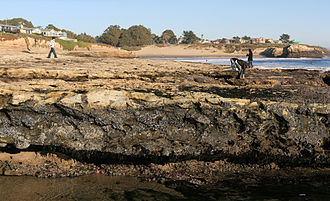Tide pool



Tide pools, also known as rock pools, are shallow pools of seawater that form on the rocky intertidal shore. Many of these pools exist as separate bodies of water only at low tide and are habitats of uniquely adaptable animals that have managed to survive in a constantly changing environment, where they are exposed to the varying conditions of high and low tides.
Formation and Characteristics[edit]
Tide pools form in rocky coastal areas where the ocean meets the land. This can occur in regions made of hard rock as well as those with softer sedimentary rocks. The formation of tide pools is a result of the erosion caused by the sea. Over time, the constant action of waves hitting against the rocks creates small holes and crevices. These indentations can become deeper and wider, eventually forming pools that can hold seawater. The size and depth of tide pools can vary greatly, from shallow puddles to deeper pools several meters in diameter.
Ecology[edit]
The ecology of tide pools is complex and varies widely depending on their location around the world. Tide pools provide a home for hardy species such as sea anemones, barnacles, mussels, sea stars (starfish), and various types of algae. These organisms must be able to survive the harsh conditions of the tidal environment, including exposure to the sun, varying salinity levels, and the force of waves.
Tide pool organisms have adapted in various ways to cope with the challenges of their environment. For example, sea anemones can retract their tentacles to prevent water loss, while barnacles have hard shells that protect them from desiccation and predation. Mussels use strong byssal threads to attach themselves to rocks, helping them resist the force of crashing waves.
Conservation[edit]
Tide pools are sensitive environments that can be easily affected by human activities such as pollution, trampling by visitors, and over-collection of species. Conservation efforts are important to protect these unique ecosystems. This includes educating the public about the importance of tide pools, implementing protective measures to minimize human impact, and conducting scientific research to understand the dynamics of tide pool ecosystems better.
Exploration and Education[edit]
Tide pools offer an accessible way for people to learn about marine biology and the importance of marine ecosystems. Many coastal areas with tide pools have established guidelines for visitors to minimize impact, including not removing animals from pools, stepping carefully to avoid damaging organisms, and not leaving trash behind.
See Also[edit]
This marine-related article is a stub. You can help WikiMD by expanding it.
Ad. Transform your life with W8MD's Budget GLP-1 injections from $49.99


W8MD offers a medical weight loss program to lose weight in Philadelphia. Our physician-supervised medical weight loss provides:
- Weight loss injections in NYC (generic and brand names):
- Zepbound / Mounjaro, Wegovy / Ozempic, Saxenda
- Most insurances accepted or discounted self-pay rates. We will obtain insurance prior authorizations if needed.
- Generic GLP1 weight loss injections from $49.99 for the starting dose of Semaglutide and $65.00 for Tirzepatide.
- Also offer prescription weight loss medications including Phentermine, Qsymia, Diethylpropion, Contrave etc.
NYC weight loss doctor appointmentsNYC weight loss doctor appointments
Start your NYC weight loss journey today at our NYC medical weight loss and Philadelphia medical weight loss clinics.
- Call 718-946-5500 to lose weight in NYC or for medical weight loss in Philadelphia 215-676-2334.
- Tags:NYC medical weight loss, Philadelphia lose weight Zepbound NYC, Budget GLP1 weight loss injections, Wegovy Philadelphia, Wegovy NYC, Philadelphia medical weight loss, Brookly weight loss and Wegovy NYC
|
WikiMD's Wellness Encyclopedia |
| Let Food Be Thy Medicine Medicine Thy Food - Hippocrates |
Medical Disclaimer: WikiMD is not a substitute for professional medical advice. The information on WikiMD is provided as an information resource only, may be incorrect, outdated or misleading, and is not to be used or relied on for any diagnostic or treatment purposes. Please consult your health care provider before making any healthcare decisions or for guidance about a specific medical condition. WikiMD expressly disclaims responsibility, and shall have no liability, for any damages, loss, injury, or liability whatsoever suffered as a result of your reliance on the information contained in this site. By visiting this site you agree to the foregoing terms and conditions, which may from time to time be changed or supplemented by WikiMD. If you do not agree to the foregoing terms and conditions, you should not enter or use this site. See full disclaimer.
Credits:Most images are courtesy of Wikimedia commons, and templates, categories Wikipedia, licensed under CC BY SA or similar.
Translate this page: - East Asian
中文,
日本,
한국어,
South Asian
हिन्दी,
தமிழ்,
తెలుగు,
Urdu,
ಕನ್ನಡ,
Southeast Asian
Indonesian,
Vietnamese,
Thai,
မြန်မာဘာသာ,
বাংলা
European
español,
Deutsch,
français,
Greek,
português do Brasil,
polski,
română,
русский,
Nederlands,
norsk,
svenska,
suomi,
Italian
Middle Eastern & African
عربى,
Turkish,
Persian,
Hebrew,
Afrikaans,
isiZulu,
Kiswahili,
Other
Bulgarian,
Hungarian,
Czech,
Swedish,
മലയാളം,
मराठी,
ਪੰਜਾਬੀ,
ગુજરાતી,
Portuguese,
Ukrainian